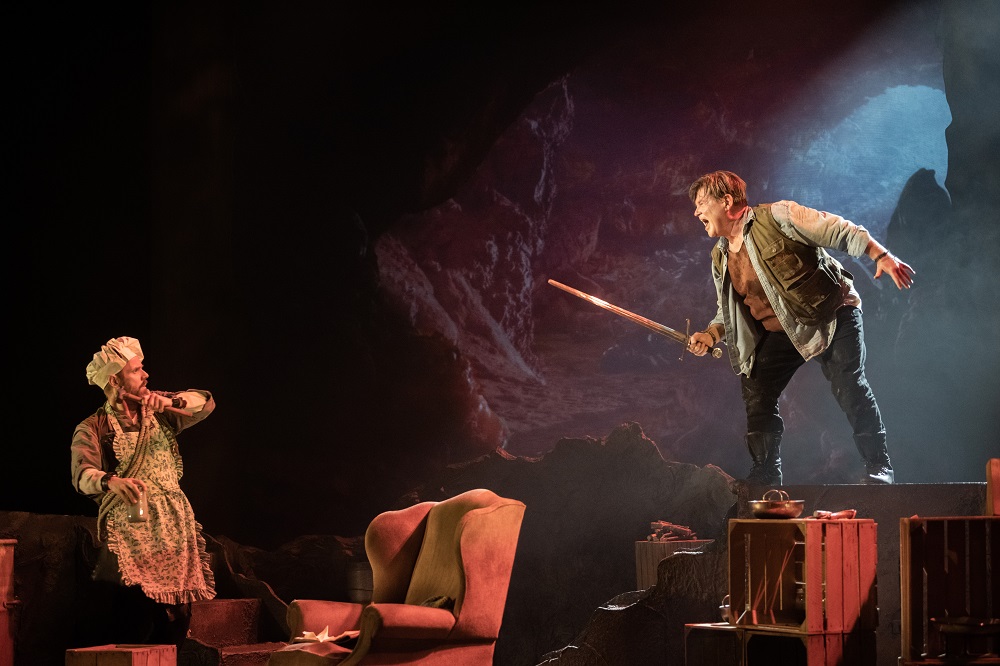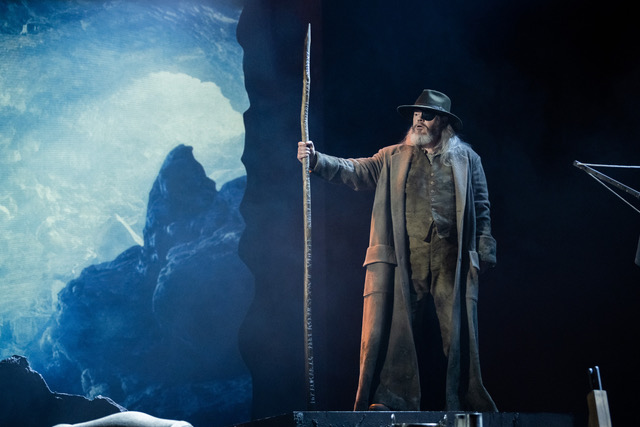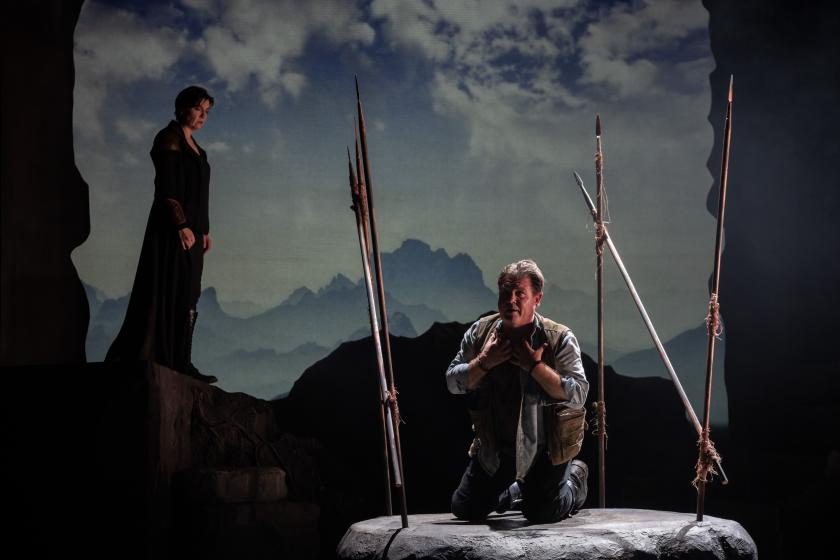With a lapse of three years between Das Rheingold and Siegfried, and with only a semi-staged Walküre in between, it’s been hard to stay tuned to Amy Lane’s Ring production at Longborough.
Here, for instance, is Mime in his cave (rather well, if shabbily, furnished in Rhiannon Newman Brown’s bric-à-brac set), struggling to mend the sword which we haven’t seen broken, for the young Siegfried, of whose all-important parentage we as yet know nothing (Adrian Dwyer's Mime and Bradley Daley's Siegfried pictured below). Here, later, is Brünnhilde asleep on her mountain-top for reasons we haven’t witnessed, though the music keeps “reminding” us and the Wanderer tells us about it at least twice in the course of the drama.
More in fact than any of the Ring operas, Siegfried is a work of flashbacks. Wagner originally devised it because friends told him Siegfrieds Tod (alias Götterdämmerung) would be incomprehensible without it, so the explicatory element was built in from the start. It’s a device that can, at its worst, hold things up, but that more often provides moments of repose, relaxations in the dramatic pace, and that enabled Wagner to develop his supreme command of transition and continuity.  You can even hear these techniques evolving in Siegfried, between the second and third acts, which were divided by 12 years in which Wagner composed Tristan and Die Meistersinger. The start of Act 3 – Wotan on the mountain path in an altercation with Erda (Mother Earth, but alas also his mistress) – is one of the greatest passages in 19th century opera, a marvellous fusion of psycho-drama and pure symphonic power. Without the 12 years, Wagner might not have managed it.
You can even hear these techniques evolving in Siegfried, between the second and third acts, which were divided by 12 years in which Wagner composed Tristan and Die Meistersinger. The start of Act 3 – Wotan on the mountain path in an altercation with Erda (Mother Earth, but alas also his mistress) – is one of the greatest passages in 19th century opera, a marvellous fusion of psycho-drama and pure symphonic power. Without the 12 years, Wagner might not have managed it.
These thoughts pop up here not least because Anthony Negus’s conducting of Wagner has matured to the point where he seems to have the discourse of this kind of music completely under his thumb. One might quarrel (very gently) with this or that tempo – this Act 3 start was, for me, on the slow side; but there is never a moment with him when one feels in the slightest degree uncomfortable about the linkages and relationships at the heart of this intellectually complex and emotionally draining music.
This was notwithstanding one or two problems in the orchestral playing at Monday’s first night. The intimate Longborough theatre (and what a joy to be back here in a full house) can sometimes cast an unwelcome light on the chamber-music aspects of Wagner’s wind scoring; and it can have an unexpected effect on balance as well. So I found myself hearing details I hadn’t heard before, and wasn’t sure I was meant to hear quite so prominently. Though the playing was mostly excellent, the sonority wasn’t always at its most generous. But all such doubts were put to bed by the final act, superbly played and sung, and wonderfully clear, with the voices where they belong but often are not in the Ring, at the top of the sound.
With one exception the cast carries on from Rheingold, and the production, practical, sensible, sometimes a bit stodgy, does so too. The exception, Paul Carey Jones’s Wanderer (ie. Wotan, pictured below), is one of several stars of the evening, vocally commanding, a forceful presence, if inclined here and there to trivialise with commonplace gestures unsuited to the Top God – even Top God on the way out. Mark Stone’s Alberich is equally thrilling, a worthy match, and Adrian Dwyer’s Mime, though camped up to a somewhat wearisome degree, is a clever portrait, sung with great character. Mae Heydorn is an Erda who, once again, makes fine capital out of her too brief appearance.  New to The Ring, of course, is the title role, sung here by the Australian tenor Bradley Daley. He’s a mixed bag, a fine, ringing Heldentenor, not quite so assured in the lyrical episodes of the Forest Murmurs, but terrific in the last act opposite the Brünnhilde of Lee Bisset, herself a consummate artist whose intelligence and musicianship are clearly infectious. Bisset’s voice is perhaps a shade less steady than in the past, but it still has those lovely dark colourings that lend such depth to her portraiture. She also moves beautifully, which alas cannot quite be said of Daley, a lumpish presence not much helped by Emma Ryott’s jumper-and-jeans costume.
New to The Ring, of course, is the title role, sung here by the Australian tenor Bradley Daley. He’s a mixed bag, a fine, ringing Heldentenor, not quite so assured in the lyrical episodes of the Forest Murmurs, but terrific in the last act opposite the Brünnhilde of Lee Bisset, herself a consummate artist whose intelligence and musicianship are clearly infectious. Bisset’s voice is perhaps a shade less steady than in the past, but it still has those lovely dark colourings that lend such depth to her portraiture. She also moves beautifully, which alas cannot quite be said of Daley, a lumpish presence not much helped by Emma Ryott’s jumper-and-jeans costume.
Lane’s staging, like her Rheingold, is mercifully concept free, though punctuated by what one might call Good Ideas. The Act 2 Woodbird (Julieth Lozano) sidles on already, tail-suited, at the end of Act 1, then turns into a sort of muse for Siegfried, like Offenbach’s Nicklausse, fawns over him, scribbles mysteriously in a notebook, leads him hand-in-hand up the mountain, etc. Back to your tree, I say. I prefer Simon Wilding’s Fafner as a Handicapped Dragon-Tramp whose crutches Siegfried steals before cradling the poor dying creature in his arms, a bonding touch between killer and killed that would have pleased Janáček.
Of course nothing can redeem Siegfried himself, a disagreeable yob who gives courage a bad name. Nothing, that is, except Wagner’s music.














Add comment